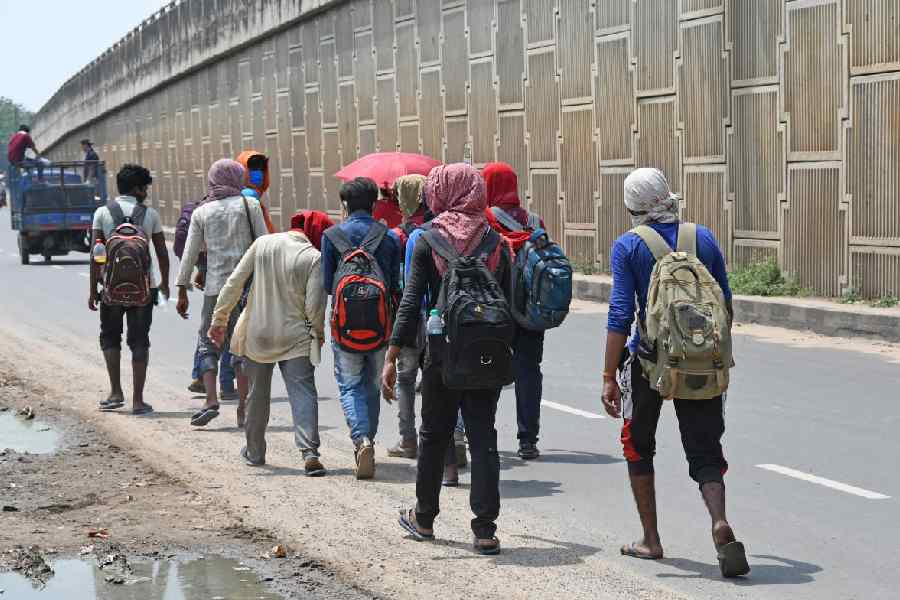A shot at electoral inclusion is taking a heavy toll on Bengal’s migrant workers. Hundreds of thousands have returned to their hometowns from workplaces across India in the past month, worried that missing the special intensive revision (SIR) of electoral rolls could jeopardise their voting rights and even raise questions about their citizenship.
The unscheduled leave from work involves travel expenses and lost daily wages, a heavy blow for those who can least afford it.
The situation is compounded by a lack of documents. Most migrant workers have not cleared Class X, meaning they lack school-leaving certificates, and many were not born in hospitals, leaving them without birth certificates. Those whose parents are absent from the 2002 electoral list are particularly anxious.
Home-bound
Md Arijul Hussain, 41, a voter in the Bhagabangola Assembly constituency, Murshidabad, usually works as a mason in Tamil Nadu. His wife also works as a labourer at construction sites. After returning to their village due to Hussain’s illness three months ago, they intended to leave again in November. However, the SIR process, which began on November 4, made them stay.
Hussain’s name does not appear on the 2002 list. His father died in 1988 when he was four, and his mother remarried and moved away. “Only my grandmother’s name is on the 2002 list. But I have no document to prove the relationship. I don’t know what to do. The booth-level officer (BLO) who came to hand the form said I should be ready for a hearing,” he said.
Bengal has around 22 lakh registered migrant workers employed outside the state, though activist groups believe the number is higher. Districts like Murshidabad, Malda, Cooch Behar, Birbhum, and East Burdwan contribute the most migrant workers to other states.
Amzed Ali, general secretary of the All-India Swarnashilpi Ekta Manch, said a few lakh goldsmiths from Bengal work in Tamil Nadu alone. “Many have left for their homes in the past three weeks,” he said. The Chennai Central railway station has been crowded with Bengal’s migrants scrambling to board packed general compartments of trains bound for the state.
“Many of them are paying through the nose for travel. They lose wages even for the days worked if they leave unannounced in the middle of the month. Yet they are rushing home for fear of losing voting rights, which they think could affect their citizenship,” Ali, who is based in Chennai, added. He is a voter in East Burdwan, and after filling out his enumeration form, has returned to Chennai.
Online challenges
According to a BLO in Calcutta, physical presence is not mandatory to submit the enumeration form. Any adult family member can fill and submit it on behalf of the absentee, and online submission is also possible. However, many migrant workers, despite owning smartphones, find online submission challenging.
A rapid survey of over 300 migrant workers in Bihar, where the SIR was conducted earlier, by the Stranded Workers Action Network (SWAN), showed that many lacked the documents required by the poll panel. SWAN is a volunteer-driven project that began after Modi announced the national lockdown in the wake of the Covid pandemic.
Samata Biswas, migration and Partition scholar and a member of the Calcutta Research Group, said: “There is nothing to suggest Bengal’s migrant workers are better positioned. During the lockdown, their plight was highlighted nationwide, but little has been done for their welfare.”
Financial strain
Rights activists said fear of disenfranchisement is pushing migrants toward financial hardship. Dumni Mandi and Basanti Kisku, both over 50, live in a village near Halisahar, North 24-Parganas. They usually travel to Andhra Pradesh with several other women from tribal families in groups of 8 to 12 to sow rice seeds. This year, they stayed back because of the SIR.
“Going away now will invite trouble. What if my name gets struck off?” said Basanti. Both women earn around ₹600 a day and receive meals from employers. Work is irregular, with days of no income.
The women hold 100-day job cards, but the scheme has been stalled since December 2020 after the Modi government halted fund releases, citing corruption. The Calcutta High Court recently ordered the immediate resumption of the scheme.
Ahead of Bengal’s SIR, organisations urged the Election Commission to ease the process for migrant workers. “We requested the inclusion of the e-Shram card as a valid document. It was denied. The fear of losing the right to vote is real among migrants,” said Asif Faruk, state general secretary of the Migrant Labourer Unity Forum.
The e-Shram is an identity card introduced to create a national database of unorganised sector workers.










